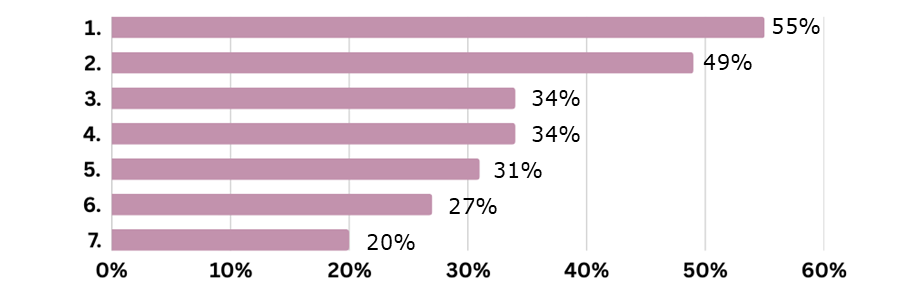Survey on teaching sensitive and controversial topics - Results

When discussing active citizenship, critical thinking and tolerance, some related topics (such as immigration, religion, sexual orientation and race) can be seen as sensitive or controversial.
In a world where opinions, often inflamed by social media, are becoming increasingly polarised, discussing these topics can be especially delicate. Teaching them can be challenging, and can even potentially escalate tensions, which threatens wellbeing and increases intolerance.
If teachers encounter resistance from parents, pupils or the local community, they may lack sufficient resources or support to address these challenges effectively. Recognising them is essential to developing teaching approaches and resources that support inclusive, respectful and deliberative discussions.
This survey aims to gather insights into the complexities and challenges of teaching sensitive topics and the most effective strategies to overcome them.
The survey gathered 354 responses, mainly from educational practitioners (83% teachers, 5% school leaders) in Spain, Türkiye, Italy and Greece.
Which of the following best describes your role?
- Teacher – early years education
- Teacher – primary education
- Teacher – secondary education
- Teacher – vocational education
- School head
- National, regional or local authority
- Teacher educator/trainer
- Education policymaker
- Parent
- In-school support (e.g. school librarian, career counsellor)
- External practitioner (visiting schools)
- Other educational professional/stakeholder
1 - Which of the following topics would you consider to be sensitive or controversial to discuss with pupils?
Sexual orientation and gender identity-based prejudices were seen as the most sensitive or controversial topics to discuss with pupils, with 77% of respondents identifying them as challenging. Other key concerns included religion (51%), anti-democratic attitudes (45%) and racism and discrimination (43%). Issues like radicalisation (40%), conspiracy theories (32%) and migration (30%) were perceived to be less difficult to address. In contrast, human rights and gender equality (22%), freedom of speech (16%) and climate change denial (16%) were considered less sensitive in classroom discussions.
In addition, some respondents mentioned (in their open responses) death, mental health, human reproduction and sexuality as issues they consider sensitive in the classroom. However, a few commented that any topic can be addressed in the classroom.
- Sexual orientation and gender identity-based prejudices
- Religion
- Anti-democratic attitudes, populism or nationalism
- Racism and discrimination (e.g. based on ethnicity or religion)
- Radicalisation, extremism and terrorism
- Conspiracy theories
- Migration
- Historical or current conflicts and wars
- Human rights and equal opportunities for men and women
- Freedom of speech
- Climate change denial
2 - In your opinion, how important is it to include sensitive and controversial topics in education to foster tolerance, respect and informed decision-making?
Most respondents (73%) believe that including sensitive and controversial topics in education is very important for fostering tolerance, respect and informed decision-making. Another 20% consider it important, while 7% see it as moderately or slightly important.
- Very important
- Important
- Moderately important
- Slightly important
- Not important at all
3 - During the past two years, how often have you encountered difficulties in addressing sensitive and controversial topics in your classroom/school?
Over the past two years, 41% of respondents occasionally faced difficulties when addressing sensitive topics in class, while 32% encountered them often or very often. Meanwhile, 20% reported rarely struggling and 4% stated they never had issues.
- Very often
- Often
- Occasionally
- Rarely
- Never
- Not applicable
4 - How confident do you feel about addressing potentially sensitive and controversial topics in your classroom or discussing them with your pupils?
When addressing sensitive topics in the classroom, 60% of respondents felt somewhat or very confident. Meanwhile, 19% remained neutral, and 18% felt somewhat or completely unconfident.
- Very confident
- Somewhat confident
- Neutral
- Somewhat unconfident
- Not confident at all
- Not applicable
5 - What are your main concerns when addressing sensitive and controversial topics in your classroom/school?
The main concerns when addressing sensitive topics in schools include the risk of student misinterpretation (57%) and negative reactions from parents (55%). Other challenges include insufficient time (38%), lack of training (34%) and heated or polarised discussions (32%). Teachers also struggle with maintaining neutrality (24%), curriculum constraints (19%), opposition from administration (16%) and a lack of culturally appropriate materials (16%). Additional worries include public criticism (14%) and personal discomfort (13%).
- Risk of misinterpretation by students
- Negative reactions from parents
- Insufficient time to explore a topic thoroughly
- Lack of training on how to address a topic
- Risk of unmanaged, heated or polarised classroom discussions
- Challenges in maintaining a neutral stance
- Pressure to stick to prescribed curriculum
- Opposition from school administration
- Lack of diverse or culturally appropriate teaching materials
- Fear of public criticism (e.g. in social media)
- Personal discomfort or uncertainty in addressing a topic
6 - Which strategies do you consider most suitable for discussing sensitive and controversial topics?
Respondents highlighted the most appropriate strategies for discussing sensitive topics as encouraging critical thinking and media literacy (43%), linking discussions to real-world examples (38%) and incorporating multiple perspectives (38%). Other common approaches involve inviting guest experts (36%), teaching debating and dialogue skills (35%) and setting ground rules for respectful communication (33%). Methods like anonymous feedback (27%), storytelling (27%) and role-play (25%) were also perceived to help create a safer discussion environment. Less frequently indicated strategies include emphasising shared values (24%), providing pre-discussion materials (15%), using only official sources (15%) and student-led debates (12%).
- Encouraging critical thinking and media literacy (e.g. hidden agendas, interests, meanings)
- Linking discussions to real-world examples or current events
- Including multiple perspectives in discussions
- Inviting guest experts
- Teaching debating and dialogue skills (e.g. listening to others, persuasive communication)
- Agreeing ground rules for respectful communication
- Providing anonymous ways for students to share their thoughts (e.g. suggestion box, online forms)
- Using storytelling or case studies to contextualise sensitive topics
- Using role-play or simulation activities to explore different perspectives
- Emphasising shared values and common goals
- Providing pre-discussion preparation materials or guidelines
- Using materials from official sources only
- Incorporating student-led discussions or debates
7 - What further support or resources, in addition to professional development and training, would help you feel more confident teaching sensitive and controversial topics?
To feel more confident teaching sensitive and controversial topics, 55% of respondents highlighted the need for culturally sensitive teaching materials and best practice examples. Other key supportive practices included international knowledge exchange (49%), peer learning and collaboration (34%) and digital tools for interactive engagement (34%). Additionally, 31% valued structured mediation or conflict resolution support, while 27% emphasised the importance of community and parental involvement. Guidance from school leadership was the least prioritised, but is still relevant at 20%.
- Access to culturally sensitive teaching materials, case studies or examples of best practices
- Opportunities for cross-country or international knowledge exchange
- Peer learning and collaboration
- Digital tools to facilitate more interactive and inclusive engagement
- Structured mediation or conflict resolution support within schools
- Community and parental involvement frameworks
- Guidance from school leadership
Discussion
While most respondents recognise the importance of these discussions in fostering tolerance, respect and informed decision-making, many also face difficulties in addressing them.
Sexual orientation and gender identity-based prejudices were identified as the most sensitive subjects, followed by religion and anti-democratic attitudes. Despite their significance, teachers occasionally struggle to address such topics, because of concerns about student misinterpretation, parental backlash and heated discussions.
However, six out of ten respondents feel at least somewhat confident in tackling these issues, relying on strategies such as critical thinking, real-world connections and multiple perspectives to facilitate constructive dialogue. To enhance teachers’ confidence, culturally sensitive materials, international knowledge exchange, and peer collaboration were identified as key support mechanisms.
Additional information
-
Education type:School Education
-
Target audience:TeacherStudent TeacherHead Teacher / PrincipalSchool PsychologistTeacher EducatorResearcher
-
Target audience ISCED:Primary education (ISCED 1)Lower secondary education (ISCED 2)








